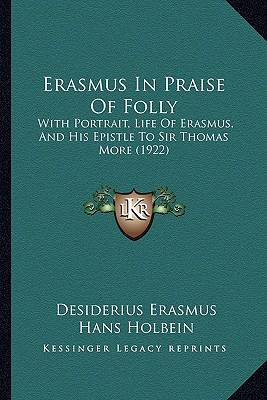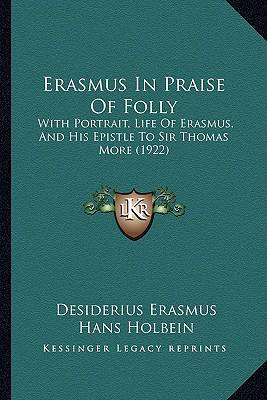
- Retrait gratuit dans votre magasin Club
- 7.000.000 titres dans notre catalogue
- Payer en toute sécurité
- Toujours un magasin près de chez vous
- Retrait gratuit dans votre magasin Club
- 7.000.0000 titres dans notre catalogue
- Payer en toute sécurité
- Toujours un magasin près de chez vous
Erasmus In Praise Of Folly
With Portrait, Life Of Erasmus, And His Epistle To Sir Thomas More (1922)
Desiderius Erasmus
Livre broché | Anglais
44,95 €
+ 89 points
Format
Description
Erasmus In Praise Of Folly is a book written by the renowned Dutch humanist and scholar, Desiderius Erasmus, in 1509. This book is a satirical essay that critiques the society and the church of his time, using the voice of Folly, a fictional character. The book is divided into several sections, including an introduction, a dedication to Sir Thomas More, and a conclusion.The book begins with Folly praising herself and her role in society, claiming that without her, the world would be a dull and miserable place. She then goes on to criticize various aspects of society, such as the obsession with wealth, the corruption of the clergy, and the hypocrisy of the church.Throughout the book, Erasmus uses humor and wit to expose the flaws and follies of his contemporaries. He also provides insightful commentary on the state of the church and the need for reform.This edition of the book, published in 1922, includes a portrait of Erasmus, a brief biography of his life, and his epistle to Sir Thomas More. The epistle is a letter written by Erasmus to his friend and fellow humanist, Sir Thomas More, in which he discusses the ideas and themes of the book.Overall, Erasmus In Praise Of Folly is a classic work of satire and a significant contribution to the Renaissance humanist movement. It remains relevant and thought-provoking to this day, offering a critical perspective on the follies of human nature and society.This scarce antiquarian book is a facsimile reprint of the old original and may contain some imperfections such as library marks and notations. Because we believe this work is culturally important, we have made it available as part of our commitment for protecting, preserving, and promoting the world's literature in affordable, high quality, modern editions, that are true to their original work.
Spécifications
Parties prenantes
- Auteur(s) :
- Editeur:
Contenu
- Nombre de pages :
- 330
- Langue:
- Anglais
Caractéristiques
- EAN:
- 9781164185123
- Date de parution :
- 10-09-10
- Format:
- Livre broché
- Format numérique:
- Trade paperback (VS)
- Dimensions :
- 152 mm x 229 mm
- Poids :
- 439 g

Les avis
Nous publions uniquement les avis qui respectent les conditions requises. Consultez nos conditions pour les avis.






